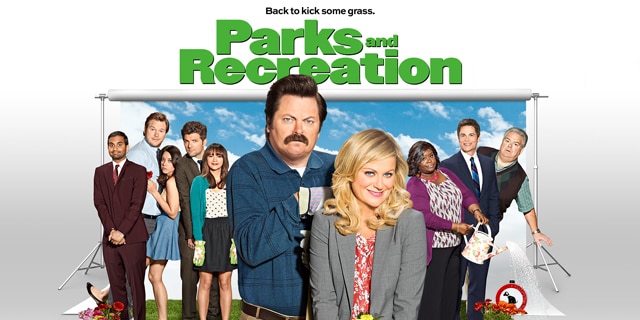 One of my favorite shows to watch is Parks and Recreation. It follows the life of devoted civil servant Leslie Knope, who works for Pawnee Parks Department, and her coworkers. Although Parks and Recreation depicts Leslie as a strong woman in government fighting for her voice to be heard, the show itself still normalizes the power structures that are the established in American government.
One of my favorite shows to watch is Parks and Recreation. It follows the life of devoted civil servant Leslie Knope, who works for Pawnee Parks Department, and her coworkers. Although Parks and Recreation depicts Leslie as a strong woman in government fighting for her voice to be heard, the show itself still normalizes the power structures that are the established in American government.Leslie is often faced with obstacles when trying to convince the councilmen of Pawnee to get on board with new policy. Leslie is outnumbered four to one by men on the city council. This supports the imbalance of power between genders in the workplace and in society. Even when it makes sense to change city laws to improve the quality of life for citizens, the men like to vote down Leslie's ideas just to spite her as a woman. Each of the councilmen represent unequal distribution of power and the ways it is normalized.
Councilman Milton is an old, practically senile man who gets away with making racist and sexist comments because of his age.
In one episode, Milton comments on Leslie's anger and frustration during a city council meeting by likening it to her "time of the month." He is also seen in another episode calling Tom Haverford, a character of Indian descent, "my strange and foreign friend." His character reinforces the normalcy of racism and sexism in people of an older age because it's 'just the way they were raised,' or because 'that's how people thought back then,' regardless of changes in modern social culture.

Councilman Dexhart is constantly being found guilty of sexual harassment and deviancy. Although his actions are always publicly addressed, he never suffers any consequences and there is not any public outcry. Dexhart never gets recalled as a councilman or is put under pressure to resign from his position in the government. Leslie, on the other hand, immediately gets put under fire when she is seen simply exchanging conversation with Dexhart. The relationship between Leslie and Dexhart points to privilege derived from sexual norms as it pertains to gender. Despite a progressive shift in American culture, sexual deviancy is still partial to men. Historically, women are slut shamed and outcast when their behavior is learned of while men acquire bragging rights and social status. Even though the sitcom uses hyperbole as a form of criticism, Parks and Recreation still reinforces and normalizes certain relationships of power.
Councilman Jamm is written as money hungry and unconstitutional. Jamm works in government for his own personal benefit and profit, and is seen constantly bribing and buying votes from people without reprimand. He is bold and brash, constantly making offensive remarks whenever he pleases. Councilman Jamm even goes as far as creating policies to benefit himself directly. In one episode he fights against Knope who is trying to get fluoride added to Pawnee's tap water. Jamm, who is also a dentist, doesn't want the people of Pawnee to have good dental health (which means no fluoride) so they have to see him. In comparison, Leslie is often under extra scrutiny because of being a woman, and setback by both internal government and public criticism for a majority of the decisions she makes.
The one councilman, Howser, who is most levelheaded and fair does not typically speak much and appears the least. I believe it is important to point out that the Milton, Dexhart, and Jamm are played by white actors while councilman Howser is played by a black actor- just one way in which Parks and Recreation creates a limited perspective of race representation in reality.
 Apart from gender tropes, one of the more obvious stereotypes Parks and Recreation likes to play with is that of American Indians. Ken Hotate, the Wamapoke Chief, is the owner of casinos and performs "traditional" ceremonies to ward off evil spirits in some episodes. It is also often mentioned and pointed out by Leslie that the murals in Pawnee's city hall building mostly illustrate the carnage that White Americans inflicted upon American Indians, which further perpetuates a narrative of disenfranchisement (or, unequal distribution of power). Although Leslie Knope tries her best to make amends for the wrongdoings of her ancestors, she often takes advantage of her privilege and position of power. In an episode where Knope is trying to delay construction of a fast food chain on an empty lot she wants to make into a park, she buries Wamapoke artifacts in the dirt. When she realizes what she has done, Leslie tries to dig the artifacts back up and apologize to Ken Hotate for being disrespectful, but it does not change the fact of her actions.
Apart from gender tropes, one of the more obvious stereotypes Parks and Recreation likes to play with is that of American Indians. Ken Hotate, the Wamapoke Chief, is the owner of casinos and performs "traditional" ceremonies to ward off evil spirits in some episodes. It is also often mentioned and pointed out by Leslie that the murals in Pawnee's city hall building mostly illustrate the carnage that White Americans inflicted upon American Indians, which further perpetuates a narrative of disenfranchisement (or, unequal distribution of power). Although Leslie Knope tries her best to make amends for the wrongdoings of her ancestors, she often takes advantage of her privilege and position of power. In an episode where Knope is trying to delay construction of a fast food chain on an empty lot she wants to make into a park, she buries Wamapoke artifacts in the dirt. When she realizes what she has done, Leslie tries to dig the artifacts back up and apologize to Ken Hotate for being disrespectful, but it does not change the fact of her actions.Less obviously but most importantly, Parks and Recreation normalizes the unequal distribution of power between government and civilians. The people of Pawnee are limited to being portrayed as ignorant, undereducated, and unable to make decisions for themselves which severely impacts the perception of power our government holds. While it might be funny for a television show, it should not be the perception of reality by viewers.

I also wrote about Parks and Rec so it's really interesting that you did as well. Considering that the show is often seen as feminist do you think that it could bee seen as commenting on the men in power in a satiracal way?
ReplyDelete